King's Own Institute FIN200: Superannuation Report - Employee Factors
VerifiedAdded on 2022/11/23
|11
|2637
|131
Report
AI Summary
This report, prepared for FIN200: Corporate Financial Management at King's Own Institute, examines the critical factors that tertiary employees should consider when making decisions about their superannuation contributions. The report delves into the differences between defined benefit plans and investment choice plans, analyzing how factors such as corruption rates, job tenure, lifestyle, and the value of a country's currency impact these choices. It also explores the significance of the time value of money, taxation policies, and opportunity costs in the decision-making process. The report highlights how employees should weigh these factors to optimize their retirement savings, emphasizing the importance of understanding the benefits and drawbacks of each plan in the context of the Australian financial landscape. The analysis suggests that investment choice plans are often favored due to lower corruption rates and the potential for higher returns, while also considering the impact of lifestyle choices and currency fluctuations on superannuation outcomes.
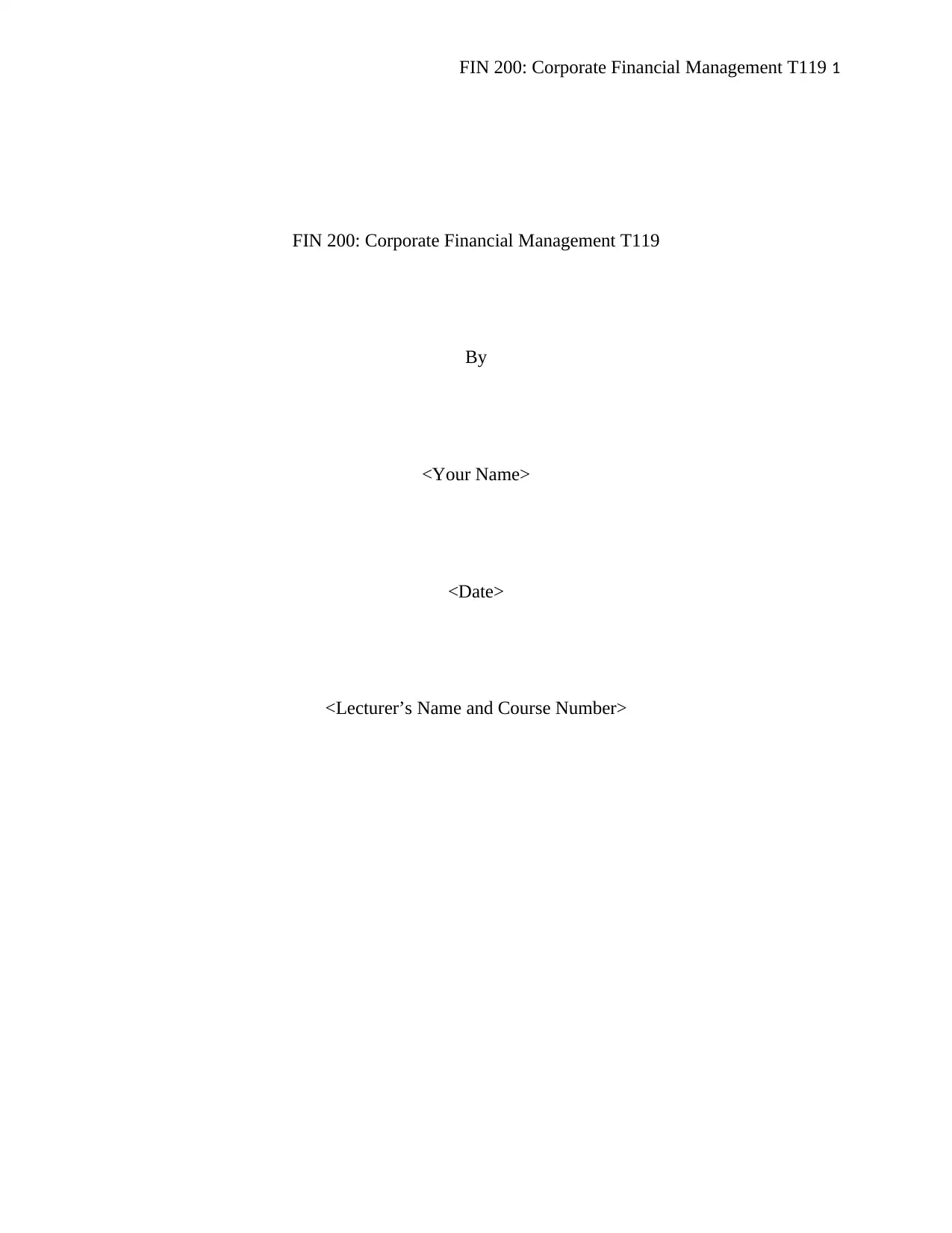
FIN 200: Corporate Financial Management T119 1
FIN 200: Corporate Financial Management T119
By
<Your Name>
<Date>
<Lecturer’s Name and Course Number>
FIN 200: Corporate Financial Management T119
By
<Your Name>
<Date>
<Lecturer’s Name and Course Number>
Paraphrase This Document
Need a fresh take? Get an instant paraphrase of this document with our AI Paraphraser
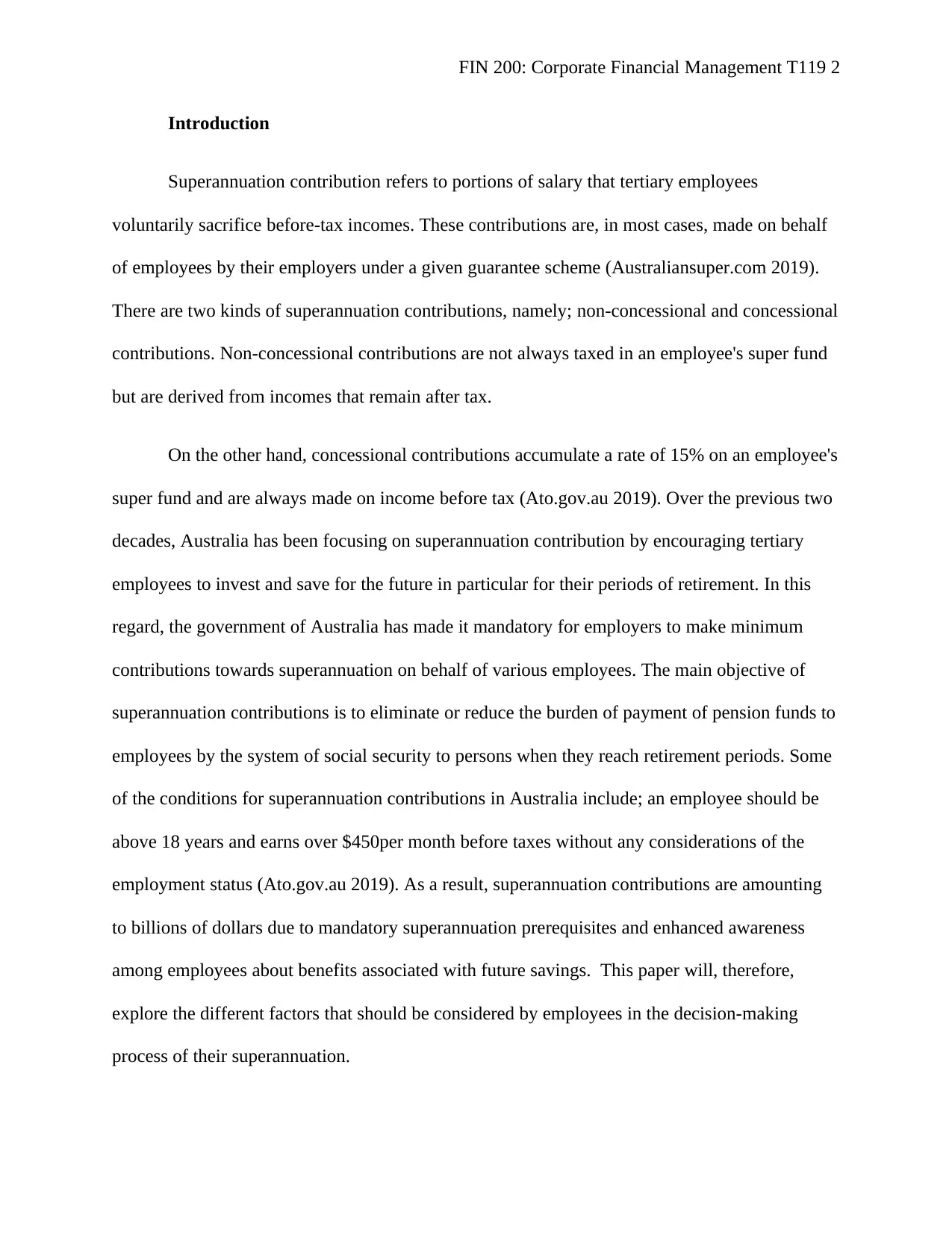
FIN 200: Corporate Financial Management T119 2
Introduction
Superannuation contribution refers to portions of salary that tertiary employees
voluntarily sacrifice before-tax incomes. These contributions are, in most cases, made on behalf
of employees by their employers under a given guarantee scheme (Australiansuper.com 2019).
There are two kinds of superannuation contributions, namely; non-concessional and concessional
contributions. Non-concessional contributions are not always taxed in an employee's super fund
but are derived from incomes that remain after tax.
On the other hand, concessional contributions accumulate a rate of 15% on an employee's
super fund and are always made on income before tax (Ato.gov.au 2019). Over the previous two
decades, Australia has been focusing on superannuation contribution by encouraging tertiary
employees to invest and save for the future in particular for their periods of retirement. In this
regard, the government of Australia has made it mandatory for employers to make minimum
contributions towards superannuation on behalf of various employees. The main objective of
superannuation contributions is to eliminate or reduce the burden of payment of pension funds to
employees by the system of social security to persons when they reach retirement periods. Some
of the conditions for superannuation contributions in Australia include; an employee should be
above 18 years and earns over $450per month before taxes without any considerations of the
employment status (Ato.gov.au 2019). As a result, superannuation contributions are amounting
to billions of dollars due to mandatory superannuation prerequisites and enhanced awareness
among employees about benefits associated with future savings. This paper will, therefore,
explore the different factors that should be considered by employees in the decision-making
process of their superannuation.
Introduction
Superannuation contribution refers to portions of salary that tertiary employees
voluntarily sacrifice before-tax incomes. These contributions are, in most cases, made on behalf
of employees by their employers under a given guarantee scheme (Australiansuper.com 2019).
There are two kinds of superannuation contributions, namely; non-concessional and concessional
contributions. Non-concessional contributions are not always taxed in an employee's super fund
but are derived from incomes that remain after tax.
On the other hand, concessional contributions accumulate a rate of 15% on an employee's
super fund and are always made on income before tax (Ato.gov.au 2019). Over the previous two
decades, Australia has been focusing on superannuation contribution by encouraging tertiary
employees to invest and save for the future in particular for their periods of retirement. In this
regard, the government of Australia has made it mandatory for employers to make minimum
contributions towards superannuation on behalf of various employees. The main objective of
superannuation contributions is to eliminate or reduce the burden of payment of pension funds to
employees by the system of social security to persons when they reach retirement periods. Some
of the conditions for superannuation contributions in Australia include; an employee should be
above 18 years and earns over $450per month before taxes without any considerations of the
employment status (Ato.gov.au 2019). As a result, superannuation contributions are amounting
to billions of dollars due to mandatory superannuation prerequisites and enhanced awareness
among employees about benefits associated with future savings. This paper will, therefore,
explore the different factors that should be considered by employees in the decision-making
process of their superannuation.
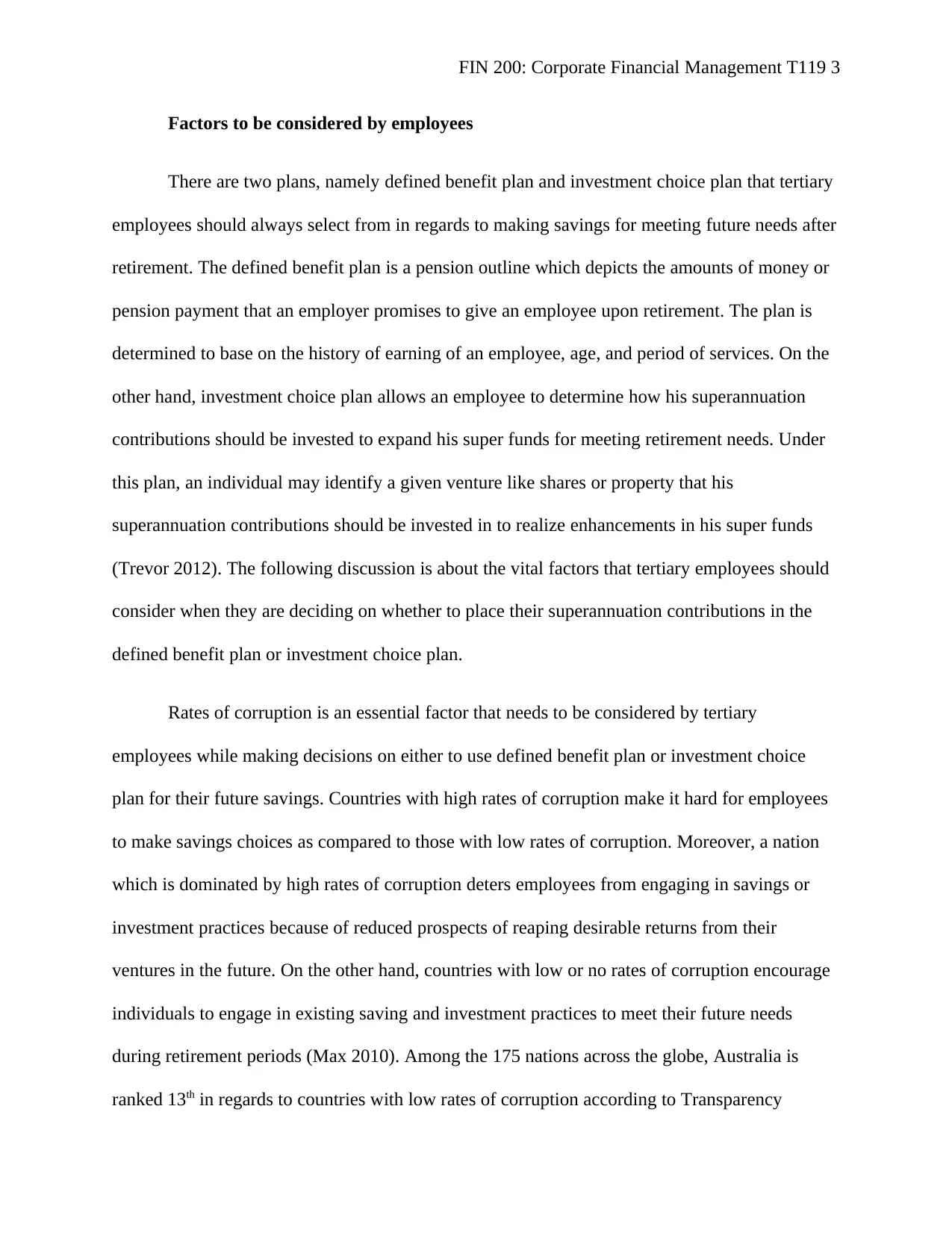
FIN 200: Corporate Financial Management T119 3
Factors to be considered by employees
There are two plans, namely defined benefit plan and investment choice plan that tertiary
employees should always select from in regards to making savings for meeting future needs after
retirement. The defined benefit plan is a pension outline which depicts the amounts of money or
pension payment that an employer promises to give an employee upon retirement. The plan is
determined to base on the history of earning of an employee, age, and period of services. On the
other hand, investment choice plan allows an employee to determine how his superannuation
contributions should be invested to expand his super funds for meeting retirement needs. Under
this plan, an individual may identify a given venture like shares or property that his
superannuation contributions should be invested in to realize enhancements in his super funds
(Trevor 2012). The following discussion is about the vital factors that tertiary employees should
consider when they are deciding on whether to place their superannuation contributions in the
defined benefit plan or investment choice plan.
Rates of corruption is an essential factor that needs to be considered by tertiary
employees while making decisions on either to use defined benefit plan or investment choice
plan for their future savings. Countries with high rates of corruption make it hard for employees
to make savings choices as compared to those with low rates of corruption. Moreover, a nation
which is dominated by high rates of corruption deters employees from engaging in savings or
investment practices because of reduced prospects of reaping desirable returns from their
ventures in the future. On the other hand, countries with low or no rates of corruption encourage
individuals to engage in existing saving and investment practices to meet their future needs
during retirement periods (Max 2010). Among the 175 nations across the globe, Australia is
ranked 13th in regards to countries with low rates of corruption according to Transparency
Factors to be considered by employees
There are two plans, namely defined benefit plan and investment choice plan that tertiary
employees should always select from in regards to making savings for meeting future needs after
retirement. The defined benefit plan is a pension outline which depicts the amounts of money or
pension payment that an employer promises to give an employee upon retirement. The plan is
determined to base on the history of earning of an employee, age, and period of services. On the
other hand, investment choice plan allows an employee to determine how his superannuation
contributions should be invested to expand his super funds for meeting retirement needs. Under
this plan, an individual may identify a given venture like shares or property that his
superannuation contributions should be invested in to realize enhancements in his super funds
(Trevor 2012). The following discussion is about the vital factors that tertiary employees should
consider when they are deciding on whether to place their superannuation contributions in the
defined benefit plan or investment choice plan.
Rates of corruption is an essential factor that needs to be considered by tertiary
employees while making decisions on either to use defined benefit plan or investment choice
plan for their future savings. Countries with high rates of corruption make it hard for employees
to make savings choices as compared to those with low rates of corruption. Moreover, a nation
which is dominated by high rates of corruption deters employees from engaging in savings or
investment practices because of reduced prospects of reaping desirable returns from their
ventures in the future. On the other hand, countries with low or no rates of corruption encourage
individuals to engage in existing saving and investment practices to meet their future needs
during retirement periods (Max 2010). Among the 175 nations across the globe, Australia is
ranked 13th in regards to countries with low rates of corruption according to Transparency
⊘ This is a preview!⊘
Do you want full access?
Subscribe today to unlock all pages.

Trusted by 1+ million students worldwide
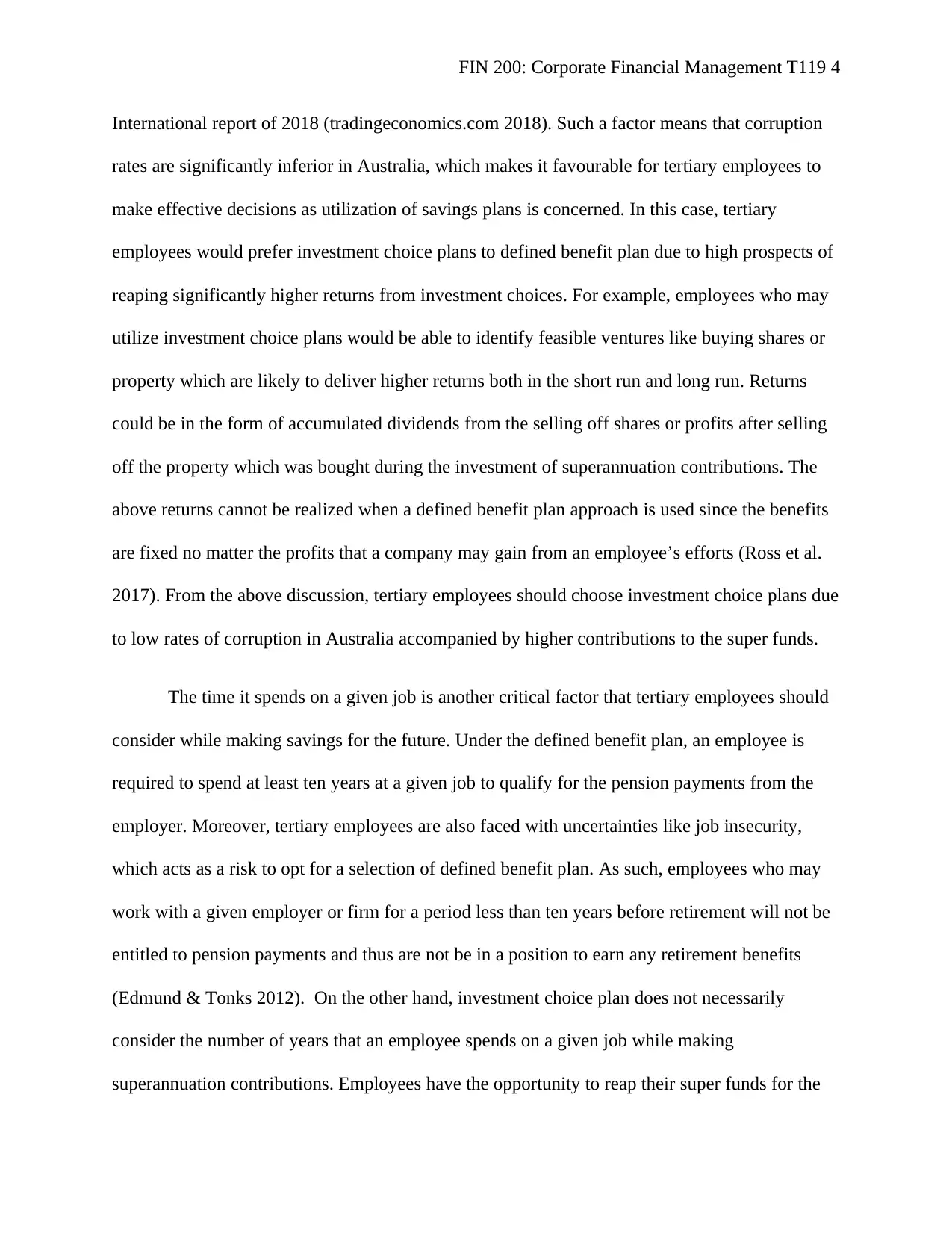
FIN 200: Corporate Financial Management T119 4
International report of 2018 (tradingeconomics.com 2018). Such a factor means that corruption
rates are significantly inferior in Australia, which makes it favourable for tertiary employees to
make effective decisions as utilization of savings plans is concerned. In this case, tertiary
employees would prefer investment choice plans to defined benefit plan due to high prospects of
reaping significantly higher returns from investment choices. For example, employees who may
utilize investment choice plans would be able to identify feasible ventures like buying shares or
property which are likely to deliver higher returns both in the short run and long run. Returns
could be in the form of accumulated dividends from the selling off shares or profits after selling
off the property which was bought during the investment of superannuation contributions. The
above returns cannot be realized when a defined benefit plan approach is used since the benefits
are fixed no matter the profits that a company may gain from an employee’s efforts (Ross et al.
2017). From the above discussion, tertiary employees should choose investment choice plans due
to low rates of corruption in Australia accompanied by higher contributions to the super funds.
The time it spends on a given job is another critical factor that tertiary employees should
consider while making savings for the future. Under the defined benefit plan, an employee is
required to spend at least ten years at a given job to qualify for the pension payments from the
employer. Moreover, tertiary employees are also faced with uncertainties like job insecurity,
which acts as a risk to opt for a selection of defined benefit plan. As such, employees who may
work with a given employer or firm for a period less than ten years before retirement will not be
entitled to pension payments and thus are not be in a position to earn any retirement benefits
(Edmund & Tonks 2012). On the other hand, investment choice plan does not necessarily
consider the number of years that an employee spends on a given job while making
superannuation contributions. Employees have the opportunity to reap their super funds for the
International report of 2018 (tradingeconomics.com 2018). Such a factor means that corruption
rates are significantly inferior in Australia, which makes it favourable for tertiary employees to
make effective decisions as utilization of savings plans is concerned. In this case, tertiary
employees would prefer investment choice plans to defined benefit plan due to high prospects of
reaping significantly higher returns from investment choices. For example, employees who may
utilize investment choice plans would be able to identify feasible ventures like buying shares or
property which are likely to deliver higher returns both in the short run and long run. Returns
could be in the form of accumulated dividends from the selling off shares or profits after selling
off the property which was bought during the investment of superannuation contributions. The
above returns cannot be realized when a defined benefit plan approach is used since the benefits
are fixed no matter the profits that a company may gain from an employee’s efforts (Ross et al.
2017). From the above discussion, tertiary employees should choose investment choice plans due
to low rates of corruption in Australia accompanied by higher contributions to the super funds.
The time it spends on a given job is another critical factor that tertiary employees should
consider while making savings for the future. Under the defined benefit plan, an employee is
required to spend at least ten years at a given job to qualify for the pension payments from the
employer. Moreover, tertiary employees are also faced with uncertainties like job insecurity,
which acts as a risk to opt for a selection of defined benefit plan. As such, employees who may
work with a given employer or firm for a period less than ten years before retirement will not be
entitled to pension payments and thus are not be in a position to earn any retirement benefits
(Edmund & Tonks 2012). On the other hand, investment choice plan does not necessarily
consider the number of years that an employee spends on a given job while making
superannuation contributions. Employees have the opportunity to reap their super funds for the
Paraphrase This Document
Need a fresh take? Get an instant paraphrase of this document with our AI Paraphraser
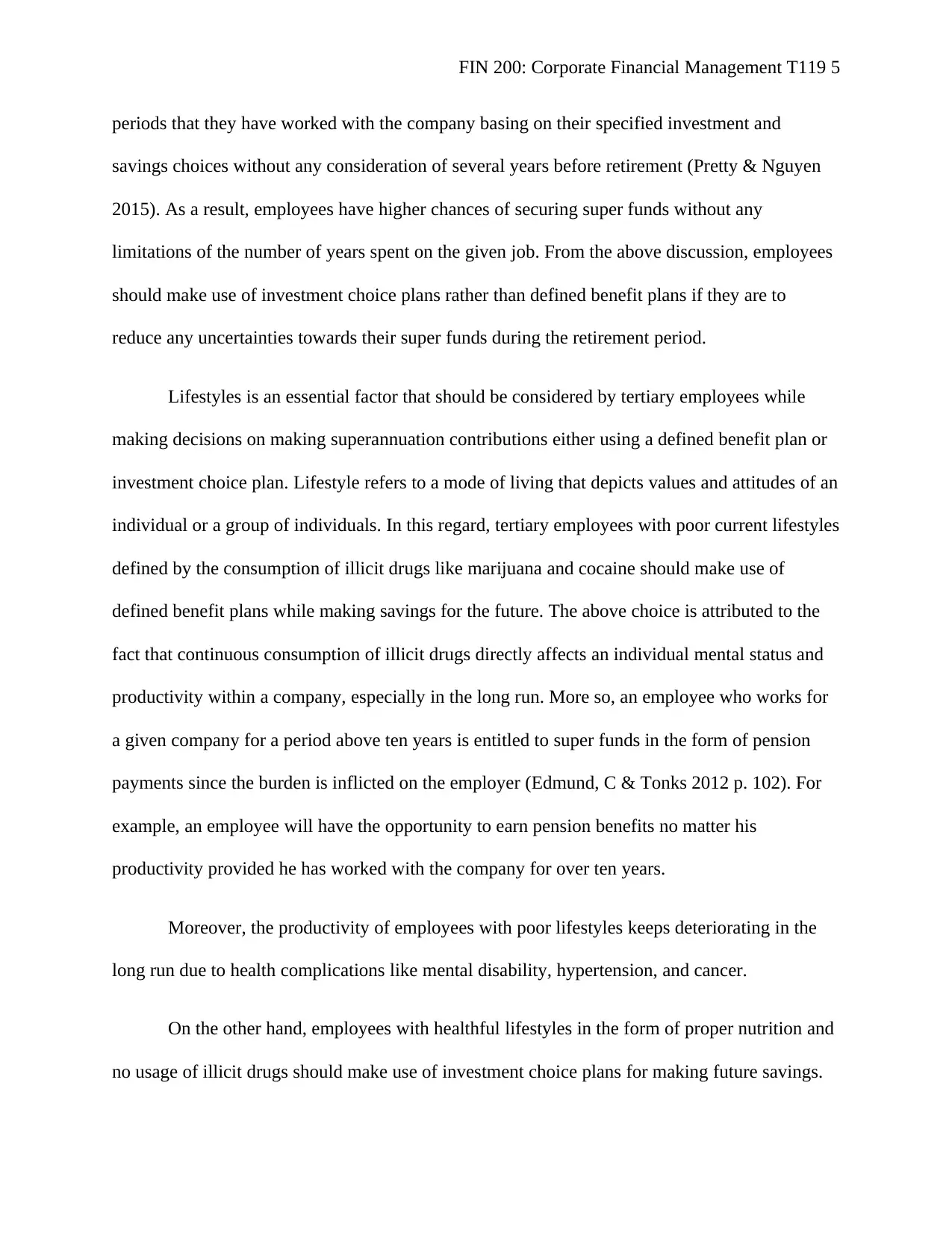
FIN 200: Corporate Financial Management T119 5
periods that they have worked with the company basing on their specified investment and
savings choices without any consideration of several years before retirement (Pretty & Nguyen
2015). As a result, employees have higher chances of securing super funds without any
limitations of the number of years spent on the given job. From the above discussion, employees
should make use of investment choice plans rather than defined benefit plans if they are to
reduce any uncertainties towards their super funds during the retirement period.
Lifestyles is an essential factor that should be considered by tertiary employees while
making decisions on making superannuation contributions either using a defined benefit plan or
investment choice plan. Lifestyle refers to a mode of living that depicts values and attitudes of an
individual or a group of individuals. In this regard, tertiary employees with poor current lifestyles
defined by the consumption of illicit drugs like marijuana and cocaine should make use of
defined benefit plans while making savings for the future. The above choice is attributed to the
fact that continuous consumption of illicit drugs directly affects an individual mental status and
productivity within a company, especially in the long run. More so, an employee who works for
a given company for a period above ten years is entitled to super funds in the form of pension
payments since the burden is inflicted on the employer (Edmund, C & Tonks 2012 p. 102). For
example, an employee will have the opportunity to earn pension benefits no matter his
productivity provided he has worked with the company for over ten years.
Moreover, the productivity of employees with poor lifestyles keeps deteriorating in the
long run due to health complications like mental disability, hypertension, and cancer.
On the other hand, employees with healthful lifestyles in the form of proper nutrition and
no usage of illicit drugs should make use of investment choice plans for making future savings.
periods that they have worked with the company basing on their specified investment and
savings choices without any consideration of several years before retirement (Pretty & Nguyen
2015). As a result, employees have higher chances of securing super funds without any
limitations of the number of years spent on the given job. From the above discussion, employees
should make use of investment choice plans rather than defined benefit plans if they are to
reduce any uncertainties towards their super funds during the retirement period.
Lifestyles is an essential factor that should be considered by tertiary employees while
making decisions on making superannuation contributions either using a defined benefit plan or
investment choice plan. Lifestyle refers to a mode of living that depicts values and attitudes of an
individual or a group of individuals. In this regard, tertiary employees with poor current lifestyles
defined by the consumption of illicit drugs like marijuana and cocaine should make use of
defined benefit plans while making savings for the future. The above choice is attributed to the
fact that continuous consumption of illicit drugs directly affects an individual mental status and
productivity within a company, especially in the long run. More so, an employee who works for
a given company for a period above ten years is entitled to super funds in the form of pension
payments since the burden is inflicted on the employer (Edmund, C & Tonks 2012 p. 102). For
example, an employee will have the opportunity to earn pension benefits no matter his
productivity provided he has worked with the company for over ten years.
Moreover, the productivity of employees with poor lifestyles keeps deteriorating in the
long run due to health complications like mental disability, hypertension, and cancer.
On the other hand, employees with healthful lifestyles in the form of proper nutrition and
no usage of illicit drugs should make use of investment choice plans for making future savings.
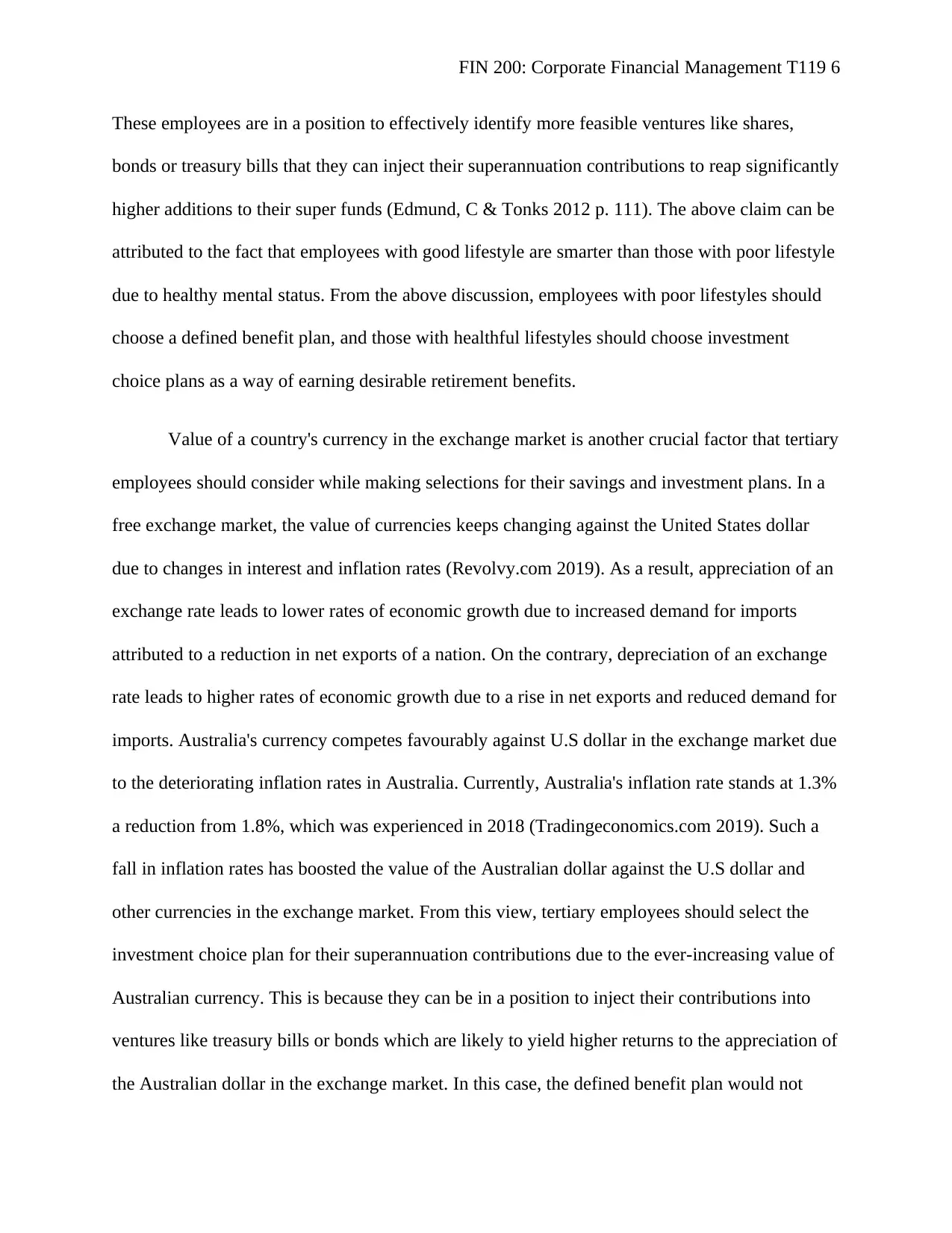
FIN 200: Corporate Financial Management T119 6
These employees are in a position to effectively identify more feasible ventures like shares,
bonds or treasury bills that they can inject their superannuation contributions to reap significantly
higher additions to their super funds (Edmund, C & Tonks 2012 p. 111). The above claim can be
attributed to the fact that employees with good lifestyle are smarter than those with poor lifestyle
due to healthy mental status. From the above discussion, employees with poor lifestyles should
choose a defined benefit plan, and those with healthful lifestyles should choose investment
choice plans as a way of earning desirable retirement benefits.
Value of a country's currency in the exchange market is another crucial factor that tertiary
employees should consider while making selections for their savings and investment plans. In a
free exchange market, the value of currencies keeps changing against the United States dollar
due to changes in interest and inflation rates (Revolvy.com 2019). As a result, appreciation of an
exchange rate leads to lower rates of economic growth due to increased demand for imports
attributed to a reduction in net exports of a nation. On the contrary, depreciation of an exchange
rate leads to higher rates of economic growth due to a rise in net exports and reduced demand for
imports. Australia's currency competes favourably against U.S dollar in the exchange market due
to the deteriorating inflation rates in Australia. Currently, Australia's inflation rate stands at 1.3%
a reduction from 1.8%, which was experienced in 2018 (Tradingeconomics.com 2019). Such a
fall in inflation rates has boosted the value of the Australian dollar against the U.S dollar and
other currencies in the exchange market. From this view, tertiary employees should select the
investment choice plan for their superannuation contributions due to the ever-increasing value of
Australian currency. This is because they can be in a position to inject their contributions into
ventures like treasury bills or bonds which are likely to yield higher returns to the appreciation of
the Australian dollar in the exchange market. In this case, the defined benefit plan would not
These employees are in a position to effectively identify more feasible ventures like shares,
bonds or treasury bills that they can inject their superannuation contributions to reap significantly
higher additions to their super funds (Edmund, C & Tonks 2012 p. 111). The above claim can be
attributed to the fact that employees with good lifestyle are smarter than those with poor lifestyle
due to healthy mental status. From the above discussion, employees with poor lifestyles should
choose a defined benefit plan, and those with healthful lifestyles should choose investment
choice plans as a way of earning desirable retirement benefits.
Value of a country's currency in the exchange market is another crucial factor that tertiary
employees should consider while making selections for their savings and investment plans. In a
free exchange market, the value of currencies keeps changing against the United States dollar
due to changes in interest and inflation rates (Revolvy.com 2019). As a result, appreciation of an
exchange rate leads to lower rates of economic growth due to increased demand for imports
attributed to a reduction in net exports of a nation. On the contrary, depreciation of an exchange
rate leads to higher rates of economic growth due to a rise in net exports and reduced demand for
imports. Australia's currency competes favourably against U.S dollar in the exchange market due
to the deteriorating inflation rates in Australia. Currently, Australia's inflation rate stands at 1.3%
a reduction from 1.8%, which was experienced in 2018 (Tradingeconomics.com 2019). Such a
fall in inflation rates has boosted the value of the Australian dollar against the U.S dollar and
other currencies in the exchange market. From this view, tertiary employees should select the
investment choice plan for their superannuation contributions due to the ever-increasing value of
Australian currency. This is because they can be in a position to inject their contributions into
ventures like treasury bills or bonds which are likely to yield higher returns to the appreciation of
the Australian dollar in the exchange market. In this case, the defined benefit plan would not
⊘ This is a preview!⊘
Do you want full access?
Subscribe today to unlock all pages.

Trusted by 1+ million students worldwide
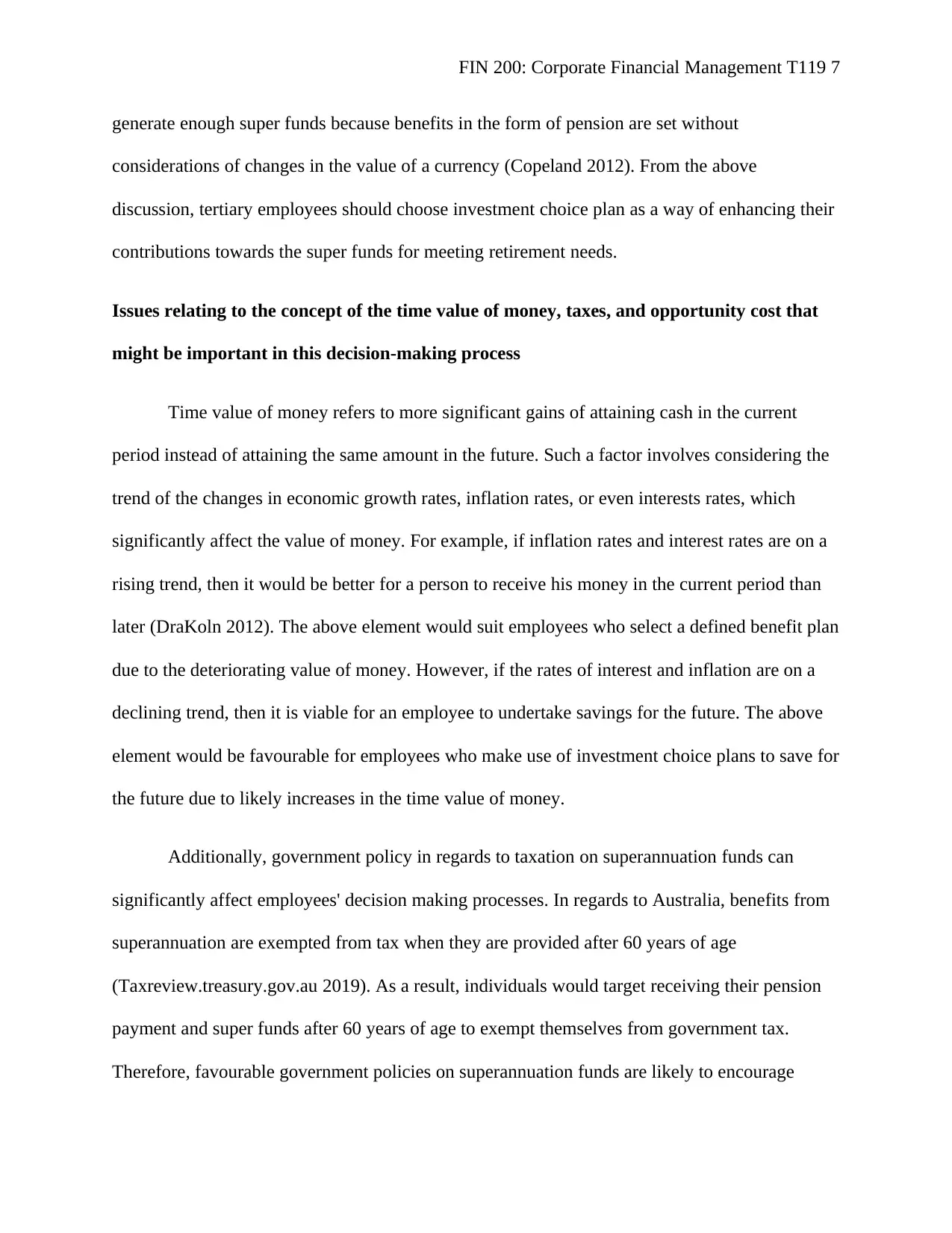
FIN 200: Corporate Financial Management T119 7
generate enough super funds because benefits in the form of pension are set without
considerations of changes in the value of a currency (Copeland 2012). From the above
discussion, tertiary employees should choose investment choice plan as a way of enhancing their
contributions towards the super funds for meeting retirement needs.
Issues relating to the concept of the time value of money, taxes, and opportunity cost that
might be important in this decision-making process
Time value of money refers to more significant gains of attaining cash in the current
period instead of attaining the same amount in the future. Such a factor involves considering the
trend of the changes in economic growth rates, inflation rates, or even interests rates, which
significantly affect the value of money. For example, if inflation rates and interest rates are on a
rising trend, then it would be better for a person to receive his money in the current period than
later (DraKoln 2012). The above element would suit employees who select a defined benefit plan
due to the deteriorating value of money. However, if the rates of interest and inflation are on a
declining trend, then it is viable for an employee to undertake savings for the future. The above
element would be favourable for employees who make use of investment choice plans to save for
the future due to likely increases in the time value of money.
Additionally, government policy in regards to taxation on superannuation funds can
significantly affect employees' decision making processes. In regards to Australia, benefits from
superannuation are exempted from tax when they are provided after 60 years of age
(Taxreview.treasury.gov.au 2019). As a result, individuals would target receiving their pension
payment and super funds after 60 years of age to exempt themselves from government tax.
Therefore, favourable government policies on superannuation funds are likely to encourage
generate enough super funds because benefits in the form of pension are set without
considerations of changes in the value of a currency (Copeland 2012). From the above
discussion, tertiary employees should choose investment choice plan as a way of enhancing their
contributions towards the super funds for meeting retirement needs.
Issues relating to the concept of the time value of money, taxes, and opportunity cost that
might be important in this decision-making process
Time value of money refers to more significant gains of attaining cash in the current
period instead of attaining the same amount in the future. Such a factor involves considering the
trend of the changes in economic growth rates, inflation rates, or even interests rates, which
significantly affect the value of money. For example, if inflation rates and interest rates are on a
rising trend, then it would be better for a person to receive his money in the current period than
later (DraKoln 2012). The above element would suit employees who select a defined benefit plan
due to the deteriorating value of money. However, if the rates of interest and inflation are on a
declining trend, then it is viable for an employee to undertake savings for the future. The above
element would be favourable for employees who make use of investment choice plans to save for
the future due to likely increases in the time value of money.
Additionally, government policy in regards to taxation on superannuation funds can
significantly affect employees' decision making processes. In regards to Australia, benefits from
superannuation are exempted from tax when they are provided after 60 years of age
(Taxreview.treasury.gov.au 2019). As a result, individuals would target receiving their pension
payment and super funds after 60 years of age to exempt themselves from government tax.
Therefore, favourable government policies on superannuation funds are likely to encourage
Paraphrase This Document
Need a fresh take? Get an instant paraphrase of this document with our AI Paraphraser
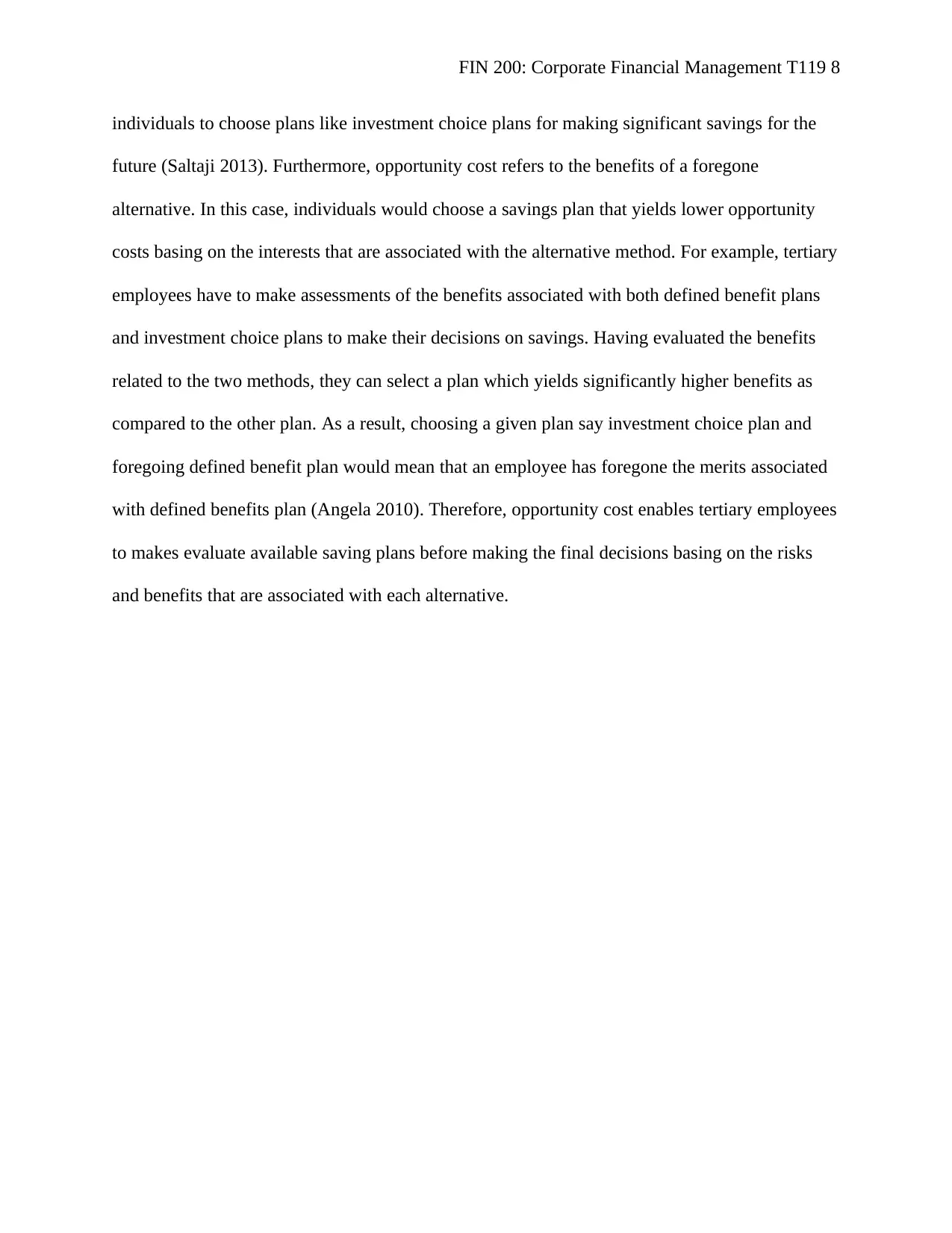
FIN 200: Corporate Financial Management T119 8
individuals to choose plans like investment choice plans for making significant savings for the
future (Saltaji 2013). Furthermore, opportunity cost refers to the benefits of a foregone
alternative. In this case, individuals would choose a savings plan that yields lower opportunity
costs basing on the interests that are associated with the alternative method. For example, tertiary
employees have to make assessments of the benefits associated with both defined benefit plans
and investment choice plans to make their decisions on savings. Having evaluated the benefits
related to the two methods, they can select a plan which yields significantly higher benefits as
compared to the other plan. As a result, choosing a given plan say investment choice plan and
foregoing defined benefit plan would mean that an employee has foregone the merits associated
with defined benefits plan (Angela 2010). Therefore, opportunity cost enables tertiary employees
to makes evaluate available saving plans before making the final decisions basing on the risks
and benefits that are associated with each alternative.
individuals to choose plans like investment choice plans for making significant savings for the
future (Saltaji 2013). Furthermore, opportunity cost refers to the benefits of a foregone
alternative. In this case, individuals would choose a savings plan that yields lower opportunity
costs basing on the interests that are associated with the alternative method. For example, tertiary
employees have to make assessments of the benefits associated with both defined benefit plans
and investment choice plans to make their decisions on savings. Having evaluated the benefits
related to the two methods, they can select a plan which yields significantly higher benefits as
compared to the other plan. As a result, choosing a given plan say investment choice plan and
foregoing defined benefit plan would mean that an employee has foregone the merits associated
with defined benefits plan (Angela 2010). Therefore, opportunity cost enables tertiary employees
to makes evaluate available saving plans before making the final decisions basing on the risks
and benefits that are associated with each alternative.
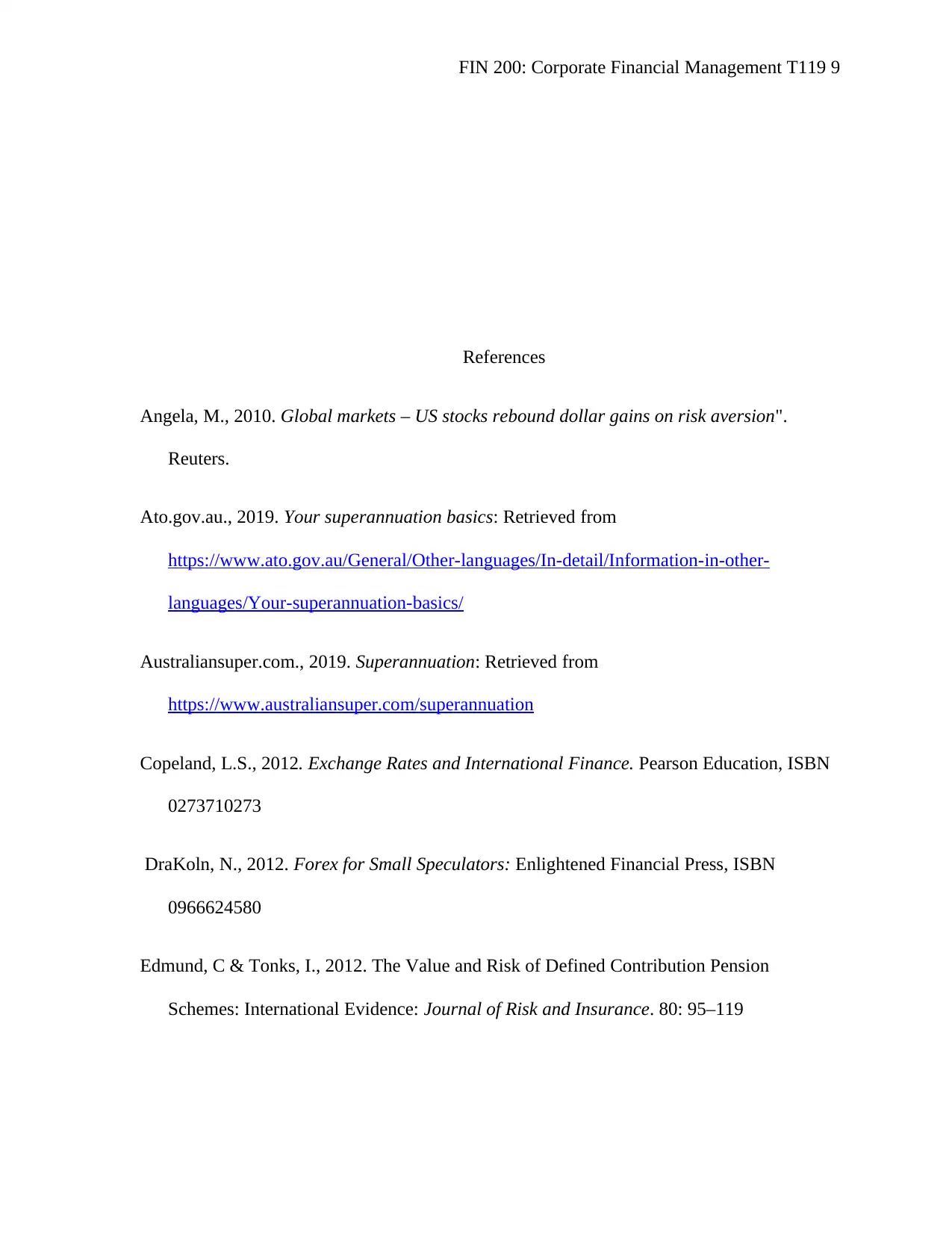
FIN 200: Corporate Financial Management T119 9
References
Angela, M., 2010. Global markets – US stocks rebound dollar gains on risk aversion".
Reuters.
Ato.gov.au., 2019. Your superannuation basics: Retrieved from
https://www.ato.gov.au/General/Other-languages/In-detail/Information-in-other-
languages/Your-superannuation-basics/
Australiansuper.com., 2019. Superannuation: Retrieved from
https://www.australiansuper.com/superannuation
Copeland, L.S., 2012. Exchange Rates and International Finance. Pearson Education, ISBN
0273710273
DraKoln, N., 2012. Forex for Small Speculators: Enlightened Financial Press, ISBN
0966624580
Edmund, C & Tonks, I., 2012. The Value and Risk of Defined Contribution Pension
Schemes: International Evidence: Journal of Risk and Insurance. 80: 95–119
References
Angela, M., 2010. Global markets – US stocks rebound dollar gains on risk aversion".
Reuters.
Ato.gov.au., 2019. Your superannuation basics: Retrieved from
https://www.ato.gov.au/General/Other-languages/In-detail/Information-in-other-
languages/Your-superannuation-basics/
Australiansuper.com., 2019. Superannuation: Retrieved from
https://www.australiansuper.com/superannuation
Copeland, L.S., 2012. Exchange Rates and International Finance. Pearson Education, ISBN
0273710273
DraKoln, N., 2012. Forex for Small Speculators: Enlightened Financial Press, ISBN
0966624580
Edmund, C & Tonks, I., 2012. The Value and Risk of Defined Contribution Pension
Schemes: International Evidence: Journal of Risk and Insurance. 80: 95–119
⊘ This is a preview!⊘
Do you want full access?
Subscribe today to unlock all pages.

Trusted by 1+ million students worldwide
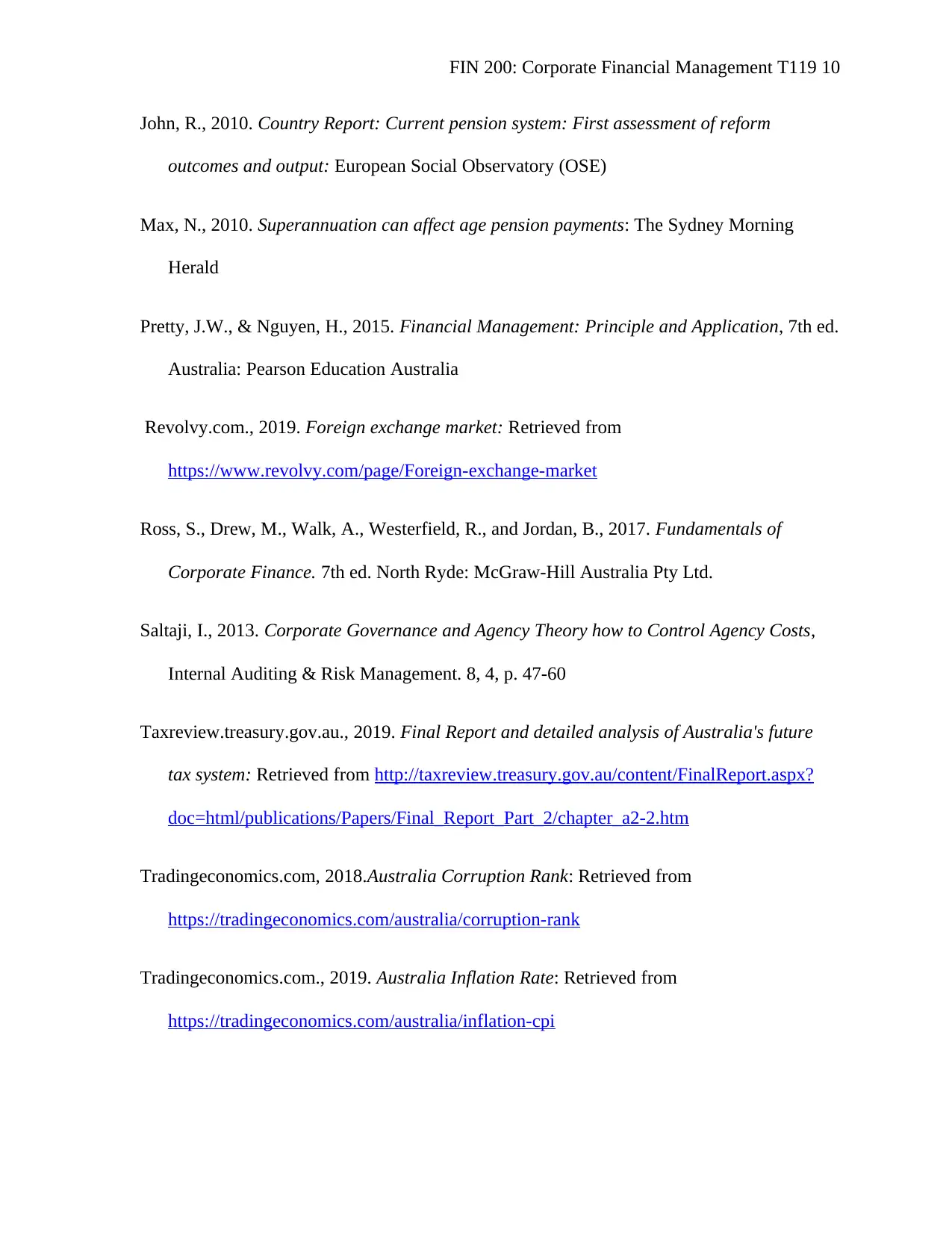
FIN 200: Corporate Financial Management T119 10
John, R., 2010. Country Report: Current pension system: First assessment of reform
outcomes and output: European Social Observatory (OSE)
Max, N., 2010. Superannuation can affect age pension payments: The Sydney Morning
Herald
Pretty, J.W., & Nguyen, H., 2015. Financial Management: Principle and Application, 7th ed.
Australia: Pearson Education Australia
Revolvy.com., 2019. Foreign exchange market: Retrieved from
https://www.revolvy.com/page/Foreign-exchange-market
Ross, S., Drew, M., Walk, A., Westerfield, R., and Jordan, B., 2017. Fundamentals of
Corporate Finance. 7th ed. North Ryde: McGraw-Hill Australia Pty Ltd.
Saltaji, I., 2013. Corporate Governance and Agency Theory how to Control Agency Costs,
Internal Auditing & Risk Management. 8, 4, p. 47-60
Taxreview.treasury.gov.au., 2019. Final Report and detailed analysis of Australia's future
tax system: Retrieved from http://taxreview.treasury.gov.au/content/FinalReport.aspx?
doc=html/publications/Papers/Final_Report_Part_2/chapter_a2-2.htm
Tradingeconomics.com, 2018.Australia Corruption Rank: Retrieved from
https://tradingeconomics.com/australia/corruption-rank
Tradingeconomics.com., 2019. Australia Inflation Rate: Retrieved from
https://tradingeconomics.com/australia/inflation-cpi
John, R., 2010. Country Report: Current pension system: First assessment of reform
outcomes and output: European Social Observatory (OSE)
Max, N., 2010. Superannuation can affect age pension payments: The Sydney Morning
Herald
Pretty, J.W., & Nguyen, H., 2015. Financial Management: Principle and Application, 7th ed.
Australia: Pearson Education Australia
Revolvy.com., 2019. Foreign exchange market: Retrieved from
https://www.revolvy.com/page/Foreign-exchange-market
Ross, S., Drew, M., Walk, A., Westerfield, R., and Jordan, B., 2017. Fundamentals of
Corporate Finance. 7th ed. North Ryde: McGraw-Hill Australia Pty Ltd.
Saltaji, I., 2013. Corporate Governance and Agency Theory how to Control Agency Costs,
Internal Auditing & Risk Management. 8, 4, p. 47-60
Taxreview.treasury.gov.au., 2019. Final Report and detailed analysis of Australia's future
tax system: Retrieved from http://taxreview.treasury.gov.au/content/FinalReport.aspx?
doc=html/publications/Papers/Final_Report_Part_2/chapter_a2-2.htm
Tradingeconomics.com, 2018.Australia Corruption Rank: Retrieved from
https://tradingeconomics.com/australia/corruption-rank
Tradingeconomics.com., 2019. Australia Inflation Rate: Retrieved from
https://tradingeconomics.com/australia/inflation-cpi
Paraphrase This Document
Need a fresh take? Get an instant paraphrase of this document with our AI Paraphraser

FIN 200: Corporate Financial Management T119 11
Trevor, C., 2012. Compulsory super: it's good, it works, and we want more of it: The
Conversation.
Trevor, C., 2012. Compulsory super: it's good, it works, and we want more of it: The
Conversation.
1 out of 11
Related Documents
Your All-in-One AI-Powered Toolkit for Academic Success.
+13062052269
info@desklib.com
Available 24*7 on WhatsApp / Email
![[object Object]](/_next/static/media/star-bottom.7253800d.svg)
Unlock your academic potential
Copyright © 2020–2026 A2Z Services. All Rights Reserved. Developed and managed by ZUCOL.




